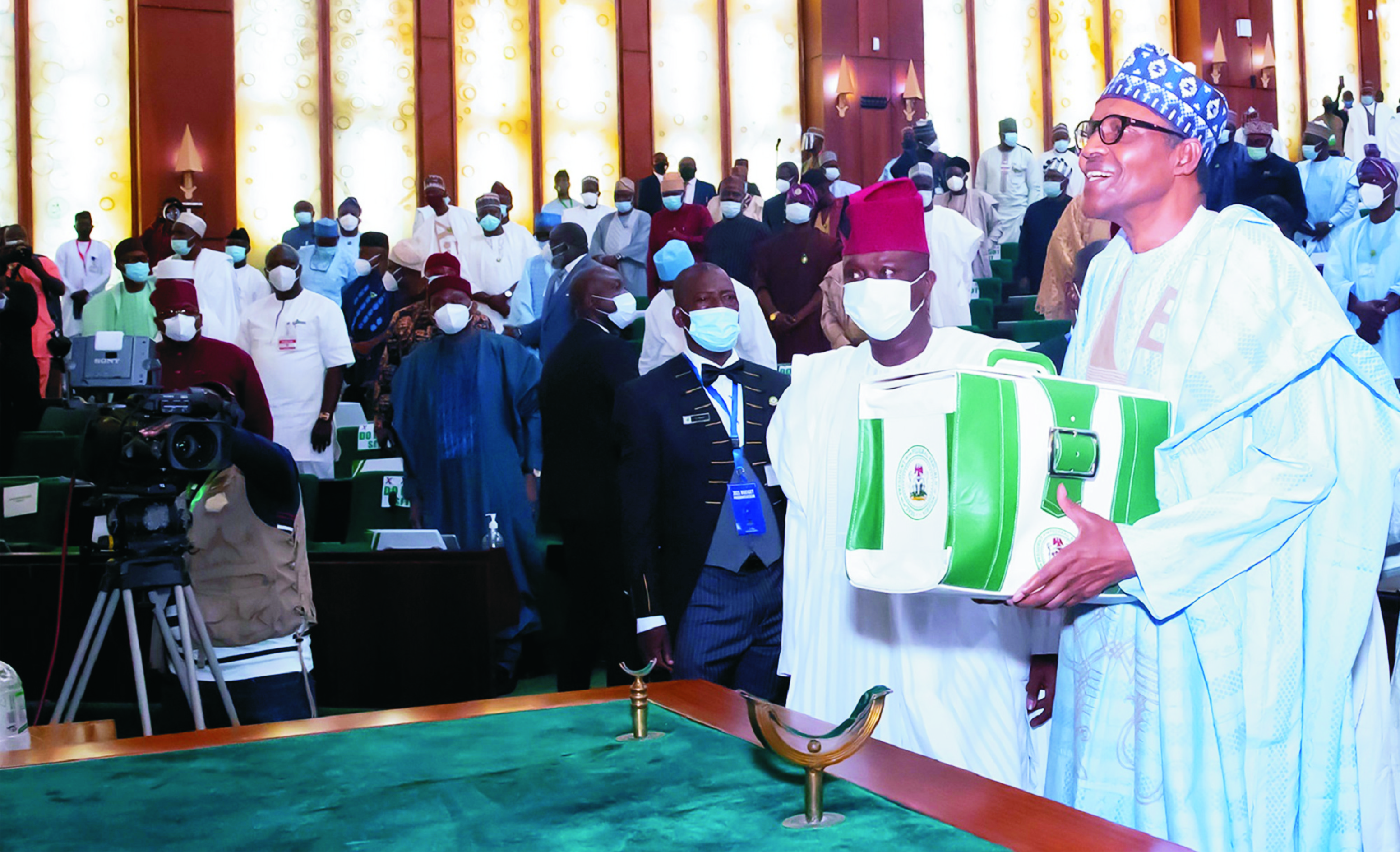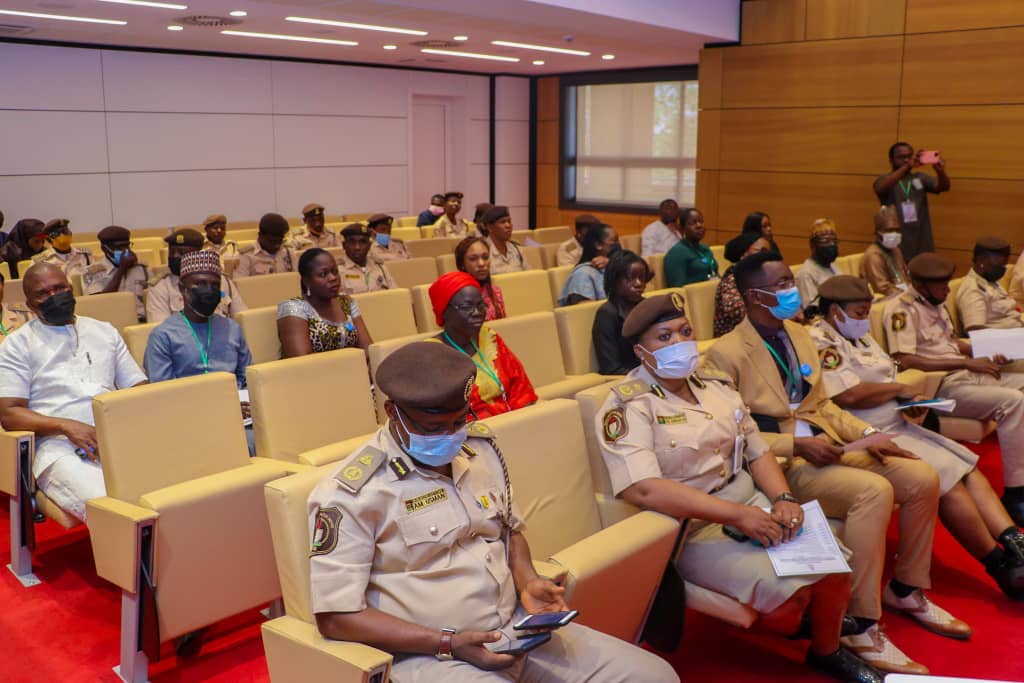News
2021 Budget: Senators Divided Across Party Lines

As the Senate begins consideration of the general principles of the Budget proposal for 2021 fiscal year, yesterday, members of the Upper Chamber have expressed divergent opinions on workability of the N13.08 trillion proposal.
While the Senate Majority Leader; Senator Yahaya Abdullahi, painted a picture of a budget of hope, some of the lawmakers from the other divide saw it from a different angle.
Leading the debate, the Senate Leader, Yahaya Abdullahi, noted that the Senate leadership was fully aware of the proposed parameters in the budget proposal.
He, therefore, urged his colleagues to critically look at the proposals and ensure that all rough edges were fine-tuned.
His words: “It is important to note at the outset, that this proposal is not strange to the leadership of the National Assembly and the Committees of Finance and National Planning. All the parameters were discussed and agreed upon, at least in principle.
“What remains for us is to closely examine the contents and the details in order to sort things out and smoothen the rough edges.
“A budget deficit of N5.19 trillion represents 3.64% of GDP, and is therefore, above the threshold set by the Fiscal Responsibility Act, 2007.
“Even though the deficit is covered by N4.28trillion of new borrowing and funds obtainable from privatization proceeds and multilateral and bilateral sources, it is important for our committees on Finance to raise the matter for the National Assembly to permit this increase, as specified in the extant law, particularly given the special circumstances which made this necessary.
“It is also important to note that a budget deficit of this size requiring more indebtedness is not healthy for the long-term development of the country, but this must be tolerated now because of the challenges of the times”, he said.
While most of the PDP senators, who contributed to the debate, picked holes in the budgetary proposals, their APC counterparts said as bad as the situations on ground are, the budgetary proposals can still bring about required recoveries in various sectors of the nation’s economy as anticipated by President Muhamnadu Buhari, who christened the budget as one of “Recovery and Resilience”.
Other APC Senators like Aliyu Sabi Abdullahi, Orji Uzor Kalu, Uba Sani, Adamu Aliero, and Ibikunle Amosun, spoke in same direction, and expressed hope in the workability of the budgetary proposals.
However, the Senate Minority Leader, Enyinnaya Abaribe, in his contribution, dissected the budget proposals, and described it as mere old news.
According to him, “The 2021 Appropriation Bill proposes to spend N13.082trillion, with expected revenue of N7.886trillion and a deficit of N5.196trillion. As with the other budgets over the last few years, it looks impractical and unimplementable.
“The major challenge, as with previous budgets, is with revenue and an overly optimistic revenue target. The 2021 budget hopes that the federal government will be able to generate almost N8trillion. If history is anything to go by, this projection looks impossible.
“This overly optimistic position is not new in Nigeria but is part of a continuing pattern of false
optimism that has put the federal government’s accounts in the deep red and the country in dire straits.
“To demonstrate this point, the observers need to look at the performance of previous approved budget revenues and what were achieved as actual revenue.
“In 2016, Nigeria had an approved budget with revenue of N3.855trillion. By the end of the year, the total retained revenue was only N2.621trillion.
“This performance was a 32 percent shortfall, according to the budget implementation reports. In 2017, instead of trying to readjust to the reality of a difficult revenue situation, Government of Nigeria repeated the same overly optimistic exercise. The approved budget had revenue of N5trillion while actual revenue that year was only N2.37trillion.
“This performance was a whopping 53 percent shortfall. In 2018, Federal Government of Nigeria
repeated the same thing by submitted a budget that expected revenue to jump from N2.37trillion to N7.165trillion. By the end of the year, actual revenue was only N3.48trillion; a 51 percent shortfall. The story was the same in 2019 and 2020. In 2019 the revenue shortfall was 41 percent and so far in 2020 the shortfall is 38 percent.
“Here we are in 2021 and the submitted budget expects revenue to be N7.886trillion. Based on the half year numbers, Nigeria would be lucky to realise N3.3trillion in revenue in 2020 by the end of the year. Yet, the Executive expects revenue to increase by over 200 percent in 2021.
“When the Executive announces a N13trillion budget, the ministries and agencies take it as a signal that the largess can continue. A casual look at the Appropriation Bill contains items like SUVs for chief executives and fancy office buildings for agencies whch really do not need them.
“All of these things will count as “capital expenditure” without adding much to the productive ability of the economy. At a time when the Executive is on the verge of a serious fiscal crisis some of these proposed spending items are unnecessary.
“The budget betrays a lack of understanding of how modern economies functions.
Other PDP Senators; including Ike Ekweremadu, Gabriel Suswam, Oker Jev, among others, made their presentations against workability of the budget.
Debate on the general principles of the 2021 budget continues today, and tomorrow.
News
FG Ends Passport Production At Multiple Centres After 62 Years

The Nigeria Immigration Service has officially ended passport production at multiple centres, transitioning to a single, centralised system for the first time in 62 years.
Minister of Interior, Dr Olubunmi Tunji-Ojo, disclosed this yesterday while inspecting Nigeria’s new Centralised Passport Personalisation Centre at the NIS Headquarters in Abuja.
He stated that since the establishment of NIS in 1963, Nigeria had never operated a central passport production centre, until now, marking a major reform milestone.
“The project is 100 per cent ready. Nigeria can now be more productive and efficient in delivering passport services,” Tunji-Ojo said.
He explained that old machines could only produce 250 to 300 passports daily, but the new system had a capacity of 4,500 to 5,000 passports every day.
“With this, NIS can now meet daily demands within just four to five hours of operation,” he added, describing it as a game-changer for passport processing in Nigeria.
“We promised two-week delivery, and we’re now pushing for one week.
“Automation and optimisation are crucial for keeping this promise to Nigerians,” the minister said.
He noted that centralisation, in line with global standards, would improve uniformity and enhance the overall integrity of Nigerian travel documents worldwide.
Tunji-Ojo described the development as a step toward bringing services closer to Nigerians while driving a culture of efficiency and total passport system reform.
He said the centralised production system aligned with President Bola Tinubu’s reform agenda, boosting NIS capacity and changing the narrative for better service delivery.
News
FAAC Disburses N2.225trn For August, Highest In Nigeria

The Federation Account Allocation Committee (FAAC) has disbursed N2.225 trillion as federation revenue for the month of August 2025, the highest ever allocation to the three tiers of government and other statutory recipients.
This marks the second consecutive month that FAAC disbursements have crossed the N2 trillion mark.
The revenue, shared at the August 2025 FAAC meeting in Abuja, was buoyed by increases in oil and gas royalty, value-added tax (VAT), and common external tariff (CET) levies, according to a communiqué issued at the end of the meeting.
Out of the N2.225 trillion total distributable revenue, FAAC said N1,478.593 trillion came from statutory revenue, N672.903 billion from VAT, N32.338 billion from the Electronic Money Transfer Levy (EMTL), and N41.284 billion from Exchange Difference.
The communiqué revealed that gross federation revenue for the month stood at N3.635 trillion. From this amount, N124.839 billion was deducted as cost of collection, while N1,285.845 trillion was set aside for transfers, interventions, refunds, and savings.
From the statutory revenue of N1.478 trillion, the Federal Government received N684.462 billion, State Governments received N347.168 billion, and Local Government Councils received N267.652 billion. A further N179.311 billion (13 per cent of mineral revenue) went to oil-producing states as derivation revenue.
From the distributable VAT revenue of N672.903 billion, the Federal Government received N100.935 billion, the states received N336.452 billion, while the local governments got N235.516 billion.
Of the N32.338 billion shared from EMTL, the Federal Government received N4.851 billion, the States received N16.169 billion, and the Local Governments received N11.318 billion.
From the N41.284 billion exchange difference, the Federal Government received N19.799 billion, the states received N10.042 billion, and the local governments received N7.742 billion, while N3.701 billion (13 per cent of mineral revenue) was shared to the oil-producing states as derivation.
News
KenPoly Governing Council Decries Inadequate Power Supply, Poor Infrastructure On Campus
The Governing Council of Kenule Beeson Saro-Wiwa Polytechnic, Bori, has decried the inadequate power supply and poor state of infrastructural facilities and equipment at the institution.
The Council also appealed to the government, including Non-Governmental Organisations, agencies, as well as well-meaning Rivers people to intervene to restore and sustain the laudable gesture, dreams and aspirations of the founding fathers of the polytechnic.
The Chairman of the newly inaugurated Council, Professor Friday B. Sigalo, made this appeal during a tour of facilities at the Polytechnic, recently.
Accompanied by members of the team, Prof Sigalo emphasised the position of technology, technical and vocational education in sustainable development.
He noted that with the prospects on ground, and the programmes and activities undertaken in the polytechnic, there is no doubt that the institution would add values to the educational system in our society and foster the desired development, if the existing challenges are jointly tackled.
This was contained in a statement signed by Deputy Registrar, Public Relations, Kenpoly, Innocent Ogbonda-Nwanwu, and made available to The Tide in Port Harcourt.
The chairman who restated the intention of his team of technocrats to ensure that KenPoly enjoys desirable face-lift, said the Council would deliver on its core mandates, accordingly.
Earlier, the Rector, KenPoly Engr. Dr. Ledum S. Gwarah, commended the appointment of Professor Friday B. Sigalo as Chairman of the KenPoly Governing Council.
He described him and his team as seasoned technocrats and expressed confidence in their ability to succeed.
The Rector pledged the management’s support to the Council to ensure that KenPoly resumes its rightful place in the comity of polytechnics in the country.
Facilities visited by the Governing Council include KenPoly workshops, laboratories, skills acquisition centre, library, hostels and medical centre.
Chinedu Wosu
-
Sports16 hours ago
FIFA rankings: S’Eagles drop Position, remain sixth in Africa
-
Sports16 hours ago
NPFL club name Iorfa new GM
-
Sports16 hours ago
NNL abolishes playoffs for NPFL promotion
-
Sports16 hours ago
CAFCL : Rivers United Arrives DR Congo
-
Sports16 hours ago
Kwara Hopeful To Host Confed Cup in Ilorin
-
Sports16 hours ago
NSF: Early preparations begin for 2026 National Sports Festival
-
Sports16 hours ago
RSG Award Renovation Work At Yakubu Gowon Stadium
-
Sports15 hours ago
RSG Pledges To Develop Baseball

